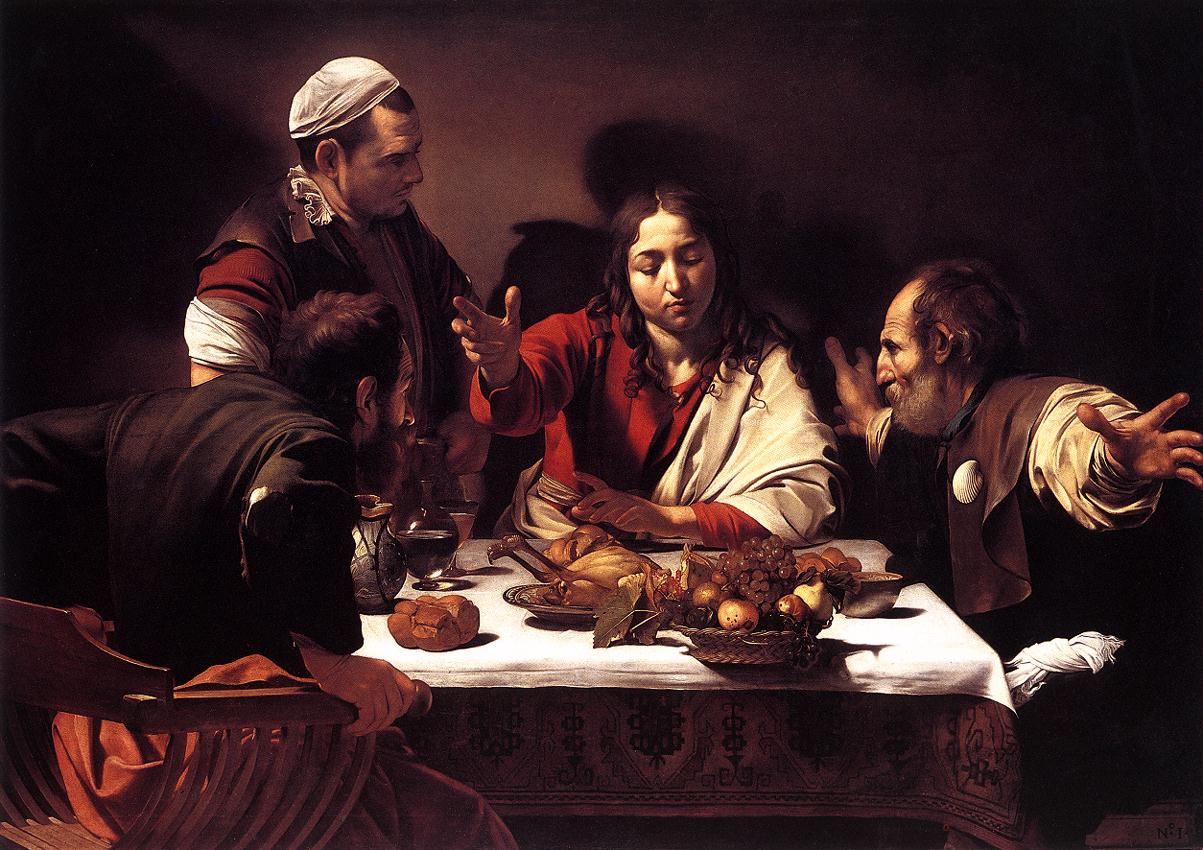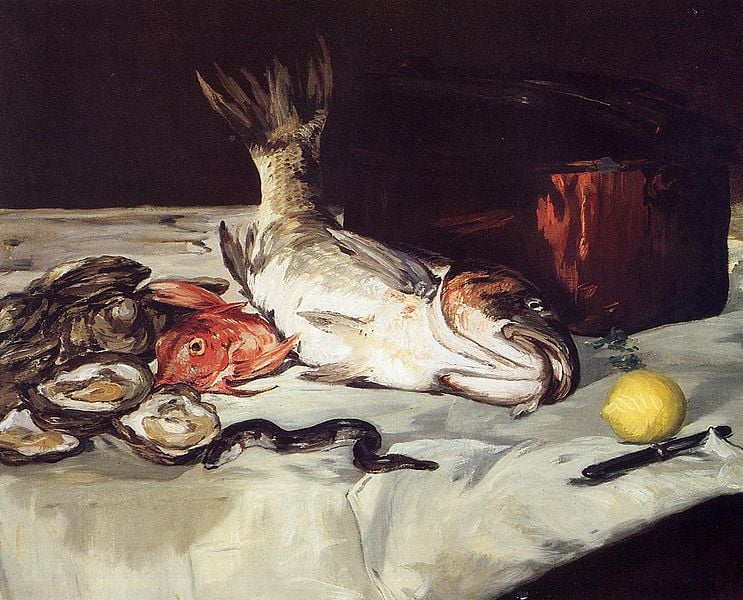(Note: I wanted to publish this last Friday, the last Friday of Lent, but, well, I forgot. So there you go.)
Sorry America, but someone has to tell you: you have a food problem.
I blame Protestantism. Yes, I blame everything on Protestantism, but there’s a reason. In his excellent food book An Economist Gets Lunch, Tyler Cowen recounts how the Prohibition destroyed America’s taste buds. No good wine, no good restaurants. Prohibition caused America’s chefs to emigrate. Then the Depression, and then World War II rationing: by the ’50s, an entire generation of Americans had lived (and grown up) eating only crap. Food is a matter of culture, and culture is a matter of education.
 Puritanism is repressive, and repression leads to bad, bad things (Catholics are called to the virtue of temperance, seen here aptly demonstrated by then-Cardinal Ratzinger). Its Puritan history gave America a repressive sexual culture, which now has exploded into the bizarre luridness we now know.
Puritanism is repressive, and repression leads to bad, bad things (Catholics are called to the virtue of temperance, seen here aptly demonstrated by then-Cardinal Ratzinger). Its Puritan history gave America a repressive sexual culture, which now has exploded into the bizarre luridness we now know.
Similarly, America’s lack of food culture has led to this apocalyptic explosion, with the cult of junk food and the equally idolatrous equal-and-opposite reaction of the cult of the “healthy” body; obesity and eating disorders. Family meals have become a thing of the past, with predictably dire consequences for family robustness and education.
Meanwhile, food is a Catholic value. It’s not a coincidence that the two historic cradles of Western Catholicism, Italy and France, are the countries best known for the succulence of their food. Catholicism is the religion of the God who gives Himself to us as food and drink. We are not souls with bodies, we are ensouled bodies, and our biological functions have a special heavenly meaning. Jesus begins his earthly ministry with a meal (Cana) and ends it with a meal (Last Supper). Once he is raised from the dead, he is raised bodily, and he reveals himself through the breaking of the bread to the Emmaus pilgrims, as in this beautiful painting by Caravaggio (as always with Caravaggio, the focus is on the light, and the light is on the table, which has become an altar). Union with God is described as a party with food (Prodigal Son), an image replete with eschatological meaning, pointing to the Wedding Feast of the Lamb of Revelation. In the early Church, each Mass was followed by an agape feast in which the faithful took part. In the Church, the history of monasticism is inseparable from the history of food–they planted the vines, they invented agricultural innovations, they made cheeses, and beer, and so forth. There ought to be a “Catholic difference” in terms of how Catholics relate to food–and yes, in many cases, there already is, and has always been (shoutout to Italian Catholics, and African American Catholics, and Latino Catholics!). We can evangelize through food–in fact, we always have.
So, not all is lost, America! For in the desolate landscape of your food culture, many green shoots are popping up (and, yes, it’s never been a completely desolate landscape, with many subtraditions, like Southern cuisine or soul food, having been vibrant all the while). It’s actually quite the little renaissance. In many ways, the richness of France’s food tradition has made it sleepy. We don’t value what we have. As Cowen points out, America’s immigrants and its culture’s talent for integrating immigrants has led to a vibrancy of ethnic cuisine. America has always integrated the best of its immigrant cultures–for many generations now, pizza has been as American as apple pie. And there is now a vibrant American food subculture, which recognizes the value of good produce, preparation, taste, and so on.
Is this an unalloyed good? As Christians, we must answer: no. Because there’s one problem with this new food subculture, which is that it’s become a class marker. In America, obsesity is pretty thoroughly connected with class, and our overclass has glommed on food culture as a way to differentiate itself from its well-off brethren. In America now, to care about food is to say “I am not one of these people.” For the Church to simply lean into this trend unquestioningly would be to reinforce class narrative and class privilege, it would be to move away from, rather than closer to, the solidarity with the poor that the Gospel calls us to. It’s not enough to say “Take the time to make home-cooked meals”–the single mother working three jobs will say with good reason, “What time?”
For those who don’t pay attention to the shenanigans of high finance (God bless you), you may not have heard about the nutritional supplement company Herbalife. Herbalife is a multi-level marketing company, meaning it makes money not just through selling its supplements, but through turning its own customers into salespeople (and those salespeople turning customers into salespeople). A hedge fund manager argued that Herbalife is not just a multi-level marketing company, but a pyramid scheme, and therefore doomed to fail, and placed a big bet against the company. Why am I talking about that? Well, one reason why this hedge fund manager thought Herbalife was a pyramid scheme was that Herbalife sold most of its products to its salespeople, rather than to other customers (this would mean that the salesmen were trying to earn money by recruiting other salesmen, and so on down the chain, rather than selling product). Another hedge fund manager with a different view argued that this was missing the point: Herbalife is not so much a food supplements company rather than a support group for people struggling with weight problems masquerading as a supplements company. This isn’t a paragraph about Herbalife (and I’m certainly not giving stock market advice!), but a paragraph to highlight that this is a real problem that countless people struggle with, and that often the way to struggle with some problem is with a support group and a support network. (Note: the group Herbalife perhaps targets most extensively is Latinos, “ie” Catholics.)
 With all these ideas in mind, here are some ideas for a ministry of food, if enterprising Catholics want to start it (and if there are already things going on (as I’m sure there are), tell me). Let’s call it the Order of Saint Lawrence, patron saint of cooks, or the Agape Confraternity, or something.
With all these ideas in mind, here are some ideas for a ministry of food, if enterprising Catholics want to start it (and if there are already things going on (as I’m sure there are), tell me). Let’s call it the Order of Saint Lawrence, patron saint of cooks, or the Agape Confraternity, or something.
- Coaching. I mean, this is the place to start. Teach people to cook. The thing about cooking is that (kind of like the liturgy, to think about it) it can be intimidating for the uninitiated, but once you have the grasp of the basics, it becomes really easy. In cooking, once you grok a handful of basic techniques and ingredients, you can do a massive number of things. One inspiration here is Jamie Oliver’s various initiatives to teach working-class people in Britain to cook. A particular focus is that “cheap”, “healthy” and “easy” doesn’t have to be a “pick two” thing. In particular, there are products that we buy from the store that we can do at home and when we do so it is cheaper, healthier and better. I am thinking here of bread (no-knead bread is sooo easy!) and yogurt. My wife makes yogurt; it is so easy, and before she’d started making it I had always hated yogurt, but that’s just because I’d never tried real yogurt. Another area of focus should be to transcend the tension in our busy lives that we feel between cooking and spending time with our families, by involving children in the cooking. My daughter loves to cook with me. I’ve been known to make our breakfast crepes with her sitting on my shoulders.
- Family night and devotions. One devotion that might be promoted by our “Order of Saint Lawrence” would be weekly family dinners, with no distractions (TV, electronic devices) where the entire family cooks and eats dinner together (and prays), and maybe plays board games or whatever (yeah, I totally stole that from the Mormons!). Another devotion might be special grace prayers for meals.
- Fasting. Fasting is a wonderful devotion and part of the spiritual life that we’ve lost track of in most of the Western Church. Fasting is poetry! We could rip-off the Orthodox fasting practices. Or, at the very least, recover fasting not just during Lent but in the run-up to the major feasts.
- Mutual support. This is where the Herbalife part comes in. A lot of people who are particularly struggling with food/weight problems to the extent that it is an unhealthy part of their life or even an addiction need mutual support, and a support network, and support groups.
- Farming. The food ecosystem in America is rotten top-to-bottom. The farm subsidy system promotes dependency and distortion in the agricultural sector, and promote the manufacture and subsidization of the most unhealthy foods. Environmental sustainability is observed most often in the breach. On the other end of the spectrum, we have pseudoscience leading to people agitating against GMOs and ascribing magical properties to “organic” food. Good food requires good produce, and this is very hard to do in the US. Because of the system, good produce in the US is very rare and/or expensive. (“Shop at Whole Foods!” is not an option for the poor, preferential or otherwise.) You don’t have to be a nutty environmentalist to recognize that animals are part of God’s good creation that we have received stewardship over and that inhumane treatment of animals on a vast scale is, at the very least, problematic. So the thing to do is to vertically integrate. Go back to the land. We really should do what these nuns are doing, except for all the heresy. (Seriously, it’s a great story, read it, and try not to rage too much at the heresy. There is good there, nonetheless.) Catholic religious have been farming amazing food (and innovating) for literally 1500 years. And we can really innovate. We need to start urban farms so the product can be close to the “customer”–and so that they can be involved in farming, and learn about it. We can build shipping container farms (and–why not–vertical farms).
- Selling. As I said, we should integrate the value chain. That means growing, and seling (just like Walter White). Sell foods through co-ops, create sustainable jobs in the neighborhood. Create CSAs, where people pay a subscription and get a box of seasonable produce every week. Create a brand for St Lawrence foods (cheese, wine, beer…) and sell that to yuppies like me so you can use the money for good works. Open restaurants to create apprenticeships and vocations for urban/working class kids.
- Schools. Hey, so, I hear the Catholic Church has, like, schools? Maybe the students there would like to eat healthy foods. Maybe they’d like classes on having a healthy, integrated relationship with food. Maybe their parents would. Maybe they’d enjoy day trips to the farm to see what real food looks like and how it’s made.
- Education and advocacy. Food policy in America is an ungodly mess. Farm subsidies (pork for pork!), especially going to unhealthy foods. Overregulation (gimme that raw milk! Also read this tragic story.) We need political advocacy. But most of all we need cultural education. As I said, there are green shoots, but overall American food culture really brings home Clémenceau’s aphorism that the US are the only culture that went from barbarism to decadence without the usual interval of civilization.
There are probably even more things to do. But this is just a handful of suggestions to start.















